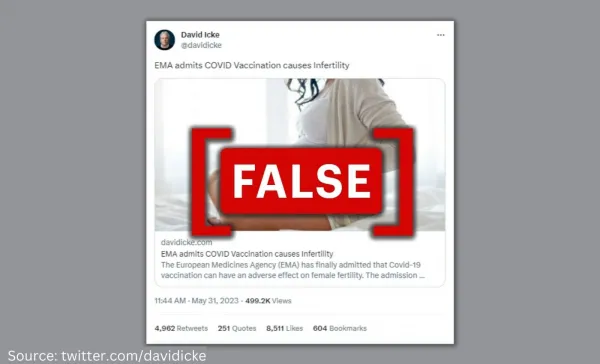By: Rahul Adhikari
June 12 2023

A October 2022 decision to add heavy menstrual bleeding as a side effect of Comirnaty and Spikevax has been misinterpreted.
Context
A post claiming that the European Medicines Agency (EMA) has admitted that COVID-19 vaccines can cause infertility is being circulating on social media. Twitter user David Icke shared an article titled "EMA admits COVID Vaccination causes Infertility" to make the claim. The post received nearly half a million views and over 8,500 likes.
The article dated May 31, 2023, quoted a 2022 EMA release to support the claim that the agency "admitted" to the link between COVID-19 vaccines and infertility. Another user on Facebook wrote, "The EMA has admitted that COVID-19 vaccines can have an adverse effect on female fertility. As a direct result the European Union is now warning pregnant women not to get the COVID-19 vaccine due to the possibility of infertility and miscarriage."
However, the claim is false. A 2022 EMA guideline on the side effects of vaccines has been misinterpreted. The agency has clarified that the vaccines are safe for pregnant women.
In Fact
The viral claim originates from an October 2022 release by the EMA about a meeting of its Pharmacovigilance Risk Assessment Committee (PRAC). Part of this document read, "The PRAC has recommended that heavy menstrual bleeding should be added to the product information as a side effect of unknown frequency of the mRNA COVID-19 vaccines Comirnaty and Spikevax." Cases of heavy menstrual bleeding have been reported after the first, second, and booster doses of Comirnaty and Spikevax, the release from EMA said.
In the same release, the agency noted, "There is no evidence to suggest the menstrual disorders experienced by some people have any impact on reproduction and fertility. Available data provides reassurance about the use of mRNA COVID-19 vaccines before and during pregnancy." It also stated that a review carried out by EMA’s Emergency Task Force showed that vaccines do not cause pregnancy complications for expectant mothers or their babies.
According to the review by EMA, the data primarily derived from studies involving over 65,000 individuals at different stages of pregnancy who received the mRNA vaccines Comirnaty and Spikevax (formerly known as COVID-19 Vaccine Moderna) show no indications of an increased risk of pregnancy complications, miscarriage, premature birth, or harm to the developing fetus caused by the COVID-19 vaccines.
Zala Grudnik, communication officer of EMA, clarified to Logically Facts that the viral claim is false. In an email response, she wrote, "The claims circulating online alleging that EMA is advising pregnant women not to receive COVID-19 vaccines as these would 'cause infertility' are false. These statements appear to be part of a deliberate disinformation campaign. These allegations are a misinterpretation of the decision of EMA's safety committee (PRAC) to add heavy menstrual bleeding as a side effect of unknown frequency in the product information for the mRNA COVID-19 vaccines Comirnaty and Spikevax."
On its website, EMA continues to recommend vaccines for pregnant women, stressing that COVID-19 vaccines protect expectant mothers and their babies. Given this, we found no evidence that the European Union is warning pregnant women not to take the COVID vaccine.
The Verdict
An EMA release noting a side effect of the COVID-19 vaccine related to menstruation has been misinterpreted to claim that the medicine agency admitted that the vaccine could cause infertility. An official from the EMA has refuted the claim, and the EMA continues to recommend the vaccine for pregnant women on its site. Therefore, we have marked this claim as false.